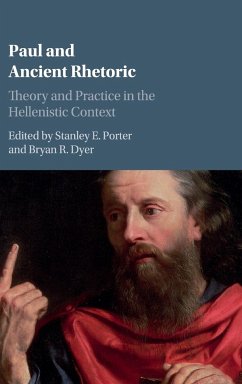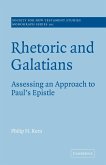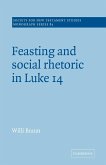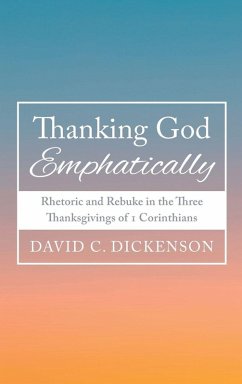Paul and Ancient Rhetoric
Herausgeber: Porter, Stanley E.; Dyer, Bryan R.
Paul and Ancient Rhetoric
Herausgeber: Porter, Stanley E.; Dyer, Bryan R.
- Gebundenes Buch
- Merkliste
- Auf die Merkliste
- Bewerten Bewerten
- Teilen
- Produkt teilen
- Produkterinnerung
- Produkterinnerung
In this volume, major international scholars examine ancient rhetoric's role in understanding Paul and his writings within his Hellenistic context.
Andere Kunden interessierten sich auch für
![Rhetoric and Galatians Rhetoric and Galatians]() Philip H. KernRhetoric and Galatians45,99 €
Philip H. KernRhetoric and Galatians45,99 €![Feasting and Social Rhetoric in Luke 14 Feasting and Social Rhetoric in Luke 14]() Willi BraunFeasting and Social Rhetoric in Luke 1457,99 €
Willi BraunFeasting and Social Rhetoric in Luke 1457,99 €![Thanking God Emphatically Thanking God Emphatically]() David C. DickensonThanking God Emphatically33,99 €
David C. DickensonThanking God Emphatically33,99 €![Kingdom Rhetoric Kingdom Rhetoric]() Kingdom Rhetoric27,99 €
Kingdom Rhetoric27,99 €![Paul against the Nations Paul against the Nations]() Neil ElliottPaul against the Nations46,99 €
Neil ElliottPaul against the Nations46,99 €![Kingdom Rhetoric Kingdom Rhetoric]() Kingdom Rhetoric37,99 €
Kingdom Rhetoric37,99 €![Gender in the Rhetoric of Jesus Gender in the Rhetoric of Jesus]() Sara ParksGender in the Rhetoric of Jesus115,99 €
Sara ParksGender in the Rhetoric of Jesus115,99 €-
-
-
In this volume, major international scholars examine ancient rhetoric's role in understanding Paul and his writings within his Hellenistic context.
Hinweis: Dieser Artikel kann nur an eine deutsche Lieferadresse ausgeliefert werden.
Hinweis: Dieser Artikel kann nur an eine deutsche Lieferadresse ausgeliefert werden.
Produktdetails
- Produktdetails
- Verlag: Cambridge University Press
- Seitenzahl: 350
- Erscheinungstermin: 3. März 2016
- Englisch
- Abmessung: 235mm x 157mm x 23mm
- Gewicht: 658g
- ISBN-13: 9781107073791
- ISBN-10: 1107073790
- Artikelnr.: 43678215
- Herstellerkennzeichnung
- Libri GmbH
- Europaallee 1
- 36244 Bad Hersfeld
- gpsr@libri.de
- Verlag: Cambridge University Press
- Seitenzahl: 350
- Erscheinungstermin: 3. März 2016
- Englisch
- Abmessung: 235mm x 157mm x 23mm
- Gewicht: 658g
- ISBN-13: 9781107073791
- ISBN-10: 1107073790
- Artikelnr.: 43678215
- Herstellerkennzeichnung
- Libri GmbH
- Europaallee 1
- 36244 Bad Hersfeld
- gpsr@libri.de
Paul and ancient rhetoric: an introduction to a continuing discussion
Stanley E. Porter and Bryan R. Dyer; Part I. History of Scholarship and Key
Issues: 1. Can the theory of rhetoric help us to understand the New
Testament, and in particular the letters of Paul? Carl Joachim Classen;
Part II. Paul, his Education, and First-Century Culture: 2. Paul in Tarsus:
historical factors in assessing Paul's early education Andrew W. Pitts; 3.
Hellenistic rhetorical education and Paul's letters Christos Kremmydas; 4.
Paul and traditions of Graeco-Roman rhetoric Frank W. Hughes; 5. Ancient
literate culture and popular rhetorical knowledge: implications for
studying Pauline rhetoric Stanley E. Porter; Part III. Issues in the Use of
Ancient Rhetoric in Analyzing Paul's Letters: 6. 'Delivery, delivery,
delivery': accounting for performance in the rhetoric of Paul's letters
Glenn Holland; 7. Rhetoric and epistolography - case not closed Lauri
Thurén; Part IV. Paul and Ancient Rhetoric in Practice: 8. Paul, classical
rhetoric, and oracular fullness of meaning in Romans 1:16-17 Robert G.
Hall; 9. 'I do not understand what I do': a challenge to understanding
Romans 7 as prosopopoeia Bryan R. Dyer; 10. Parenesis and peroratio: the
rhetorical function of Romans 12:1-15:13 Mark D. Given; 11. Navigating
First Thessalonians employing Aristotle's enthymeme Thomas H. Olbricht and
Stanley N. Helton; 12. Appeals to logos, pathos, and ethos in Galatians
5:1-12: an investigation of Paul's inventio David A. deSilva; 13.
Visualizing Philippians: ancient rhetorical practice meets cognitive
science through sociorhetorical interpretation L. Gregory Bloomquist.
Stanley E. Porter and Bryan R. Dyer; Part I. History of Scholarship and Key
Issues: 1. Can the theory of rhetoric help us to understand the New
Testament, and in particular the letters of Paul? Carl Joachim Classen;
Part II. Paul, his Education, and First-Century Culture: 2. Paul in Tarsus:
historical factors in assessing Paul's early education Andrew W. Pitts; 3.
Hellenistic rhetorical education and Paul's letters Christos Kremmydas; 4.
Paul and traditions of Graeco-Roman rhetoric Frank W. Hughes; 5. Ancient
literate culture and popular rhetorical knowledge: implications for
studying Pauline rhetoric Stanley E. Porter; Part III. Issues in the Use of
Ancient Rhetoric in Analyzing Paul's Letters: 6. 'Delivery, delivery,
delivery': accounting for performance in the rhetoric of Paul's letters
Glenn Holland; 7. Rhetoric and epistolography - case not closed Lauri
Thurén; Part IV. Paul and Ancient Rhetoric in Practice: 8. Paul, classical
rhetoric, and oracular fullness of meaning in Romans 1:16-17 Robert G.
Hall; 9. 'I do not understand what I do': a challenge to understanding
Romans 7 as prosopopoeia Bryan R. Dyer; 10. Parenesis and peroratio: the
rhetorical function of Romans 12:1-15:13 Mark D. Given; 11. Navigating
First Thessalonians employing Aristotle's enthymeme Thomas H. Olbricht and
Stanley N. Helton; 12. Appeals to logos, pathos, and ethos in Galatians
5:1-12: an investigation of Paul's inventio David A. deSilva; 13.
Visualizing Philippians: ancient rhetorical practice meets cognitive
science through sociorhetorical interpretation L. Gregory Bloomquist.
Paul and ancient rhetoric: an introduction to a continuing discussion
Stanley E. Porter and Bryan R. Dyer; Part I. History of Scholarship and Key
Issues: 1. Can the theory of rhetoric help us to understand the New
Testament, and in particular the letters of Paul? Carl Joachim Classen;
Part II. Paul, his Education, and First-Century Culture: 2. Paul in Tarsus:
historical factors in assessing Paul's early education Andrew W. Pitts; 3.
Hellenistic rhetorical education and Paul's letters Christos Kremmydas; 4.
Paul and traditions of Graeco-Roman rhetoric Frank W. Hughes; 5. Ancient
literate culture and popular rhetorical knowledge: implications for
studying Pauline rhetoric Stanley E. Porter; Part III. Issues in the Use of
Ancient Rhetoric in Analyzing Paul's Letters: 6. 'Delivery, delivery,
delivery': accounting for performance in the rhetoric of Paul's letters
Glenn Holland; 7. Rhetoric and epistolography - case not closed Lauri
Thurén; Part IV. Paul and Ancient Rhetoric in Practice: 8. Paul, classical
rhetoric, and oracular fullness of meaning in Romans 1:16-17 Robert G.
Hall; 9. 'I do not understand what I do': a challenge to understanding
Romans 7 as prosopopoeia Bryan R. Dyer; 10. Parenesis and peroratio: the
rhetorical function of Romans 12:1-15:13 Mark D. Given; 11. Navigating
First Thessalonians employing Aristotle's enthymeme Thomas H. Olbricht and
Stanley N. Helton; 12. Appeals to logos, pathos, and ethos in Galatians
5:1-12: an investigation of Paul's inventio David A. deSilva; 13.
Visualizing Philippians: ancient rhetorical practice meets cognitive
science through sociorhetorical interpretation L. Gregory Bloomquist.
Stanley E. Porter and Bryan R. Dyer; Part I. History of Scholarship and Key
Issues: 1. Can the theory of rhetoric help us to understand the New
Testament, and in particular the letters of Paul? Carl Joachim Classen;
Part II. Paul, his Education, and First-Century Culture: 2. Paul in Tarsus:
historical factors in assessing Paul's early education Andrew W. Pitts; 3.
Hellenistic rhetorical education and Paul's letters Christos Kremmydas; 4.
Paul and traditions of Graeco-Roman rhetoric Frank W. Hughes; 5. Ancient
literate culture and popular rhetorical knowledge: implications for
studying Pauline rhetoric Stanley E. Porter; Part III. Issues in the Use of
Ancient Rhetoric in Analyzing Paul's Letters: 6. 'Delivery, delivery,
delivery': accounting for performance in the rhetoric of Paul's letters
Glenn Holland; 7. Rhetoric and epistolography - case not closed Lauri
Thurén; Part IV. Paul and Ancient Rhetoric in Practice: 8. Paul, classical
rhetoric, and oracular fullness of meaning in Romans 1:16-17 Robert G.
Hall; 9. 'I do not understand what I do': a challenge to understanding
Romans 7 as prosopopoeia Bryan R. Dyer; 10. Parenesis and peroratio: the
rhetorical function of Romans 12:1-15:13 Mark D. Given; 11. Navigating
First Thessalonians employing Aristotle's enthymeme Thomas H. Olbricht and
Stanley N. Helton; 12. Appeals to logos, pathos, and ethos in Galatians
5:1-12: an investigation of Paul's inventio David A. deSilva; 13.
Visualizing Philippians: ancient rhetorical practice meets cognitive
science through sociorhetorical interpretation L. Gregory Bloomquist.









